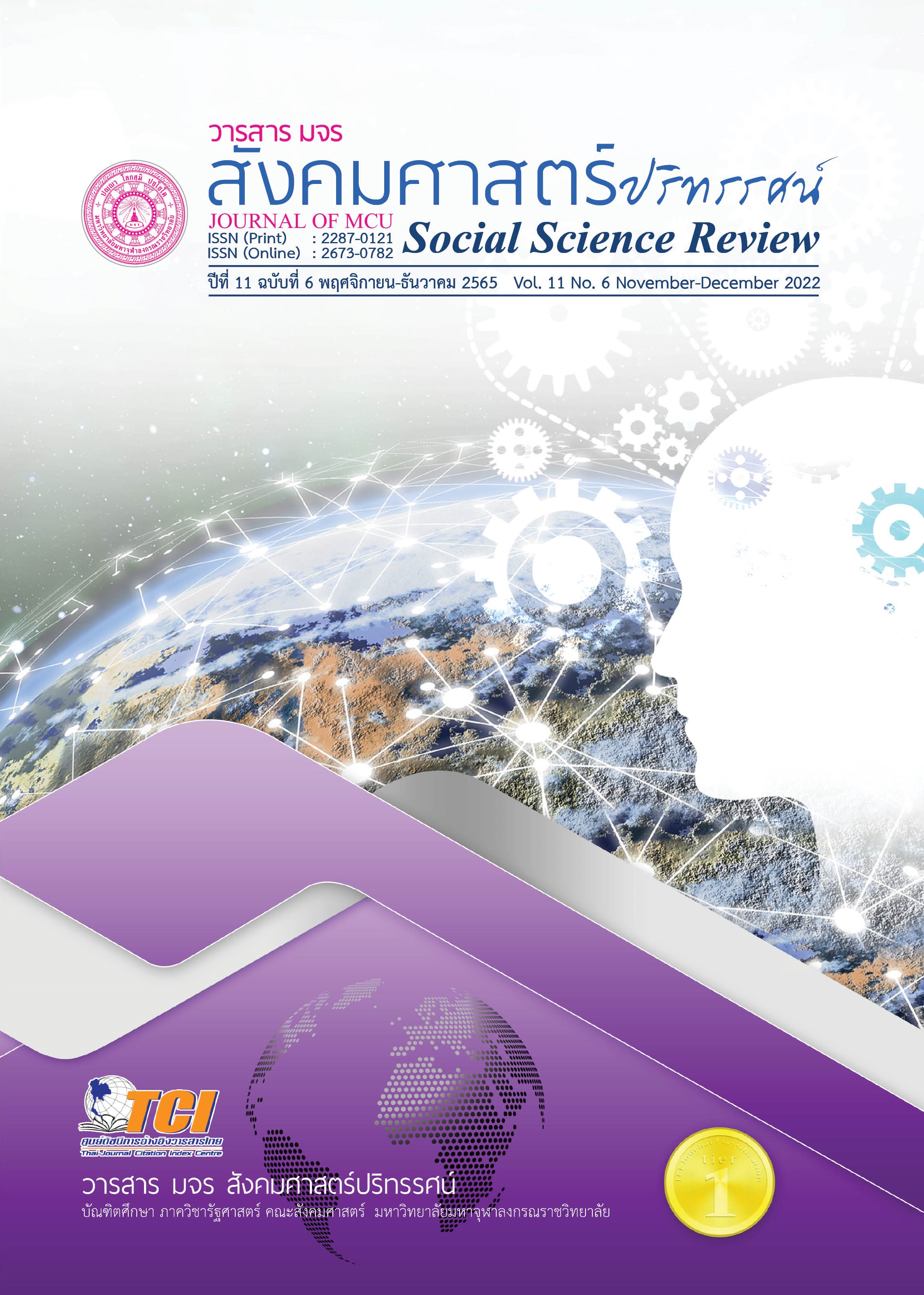การคิดแบบโยนิโสมนสิการและการรับรู้การมีกัลยาณมิตรที่เกี่ยวข้อง กับการให้อภัยผู้อื่นของวัยรุ่นชายตอนต้น
คำสำคัญ:
โยนิโสมนสิการ, กัลยาณมิตร, การให้อภัยผู้อื่นบทคัดย่อ
งานวิจัยนี้มีวัตถุประสงค์เพื่อศึกษาอำนาจในการทำนายของการคิดแบบโยนิโสมนสิการ ได้แก่ การคิดแบบสืบสาวเหตุปัจจัย การคิดแบบสามัญลักษณ์ การคิดแบบรู้ทันคุณโทษและทางออก และการคิดแบบเร้ากุศล และการรับรู้การมีกัลยาณมิตร ได้แก่ ความมีผู้ปกครองเป็นกัลยาณมิตร ความมีครูเป็นกัลยาณมิตร ความมีเพื่อนเป็นกัลยาณมิตรที่มีต่อการให้อภัยผู้อื่นของวัยรุ่นชายตอนต้นในโรงเรียนเอกชนชายล้วน กลุ่มตัวอย่างที่ใช้ในการวิจัยคือวัยรุ่นชายตอนต้นที่อยู่ในโรงเรียนเอกชนชายล้วนแห่งหนึ่งในเขตกรุงเทพมหานคร จำนวน 174 คน ซึ่งได้มาจากการเลือกกลุ่มตัวอย่างแบบตามสะดวก การเก็บข้อมูลวิจัยใช้แบบวัดที่มีลักษณะที่เป็นมาตรประเมินค่า และแบบวัดสถานการณ์ให้เลือกตอบ และสถิติที่ใช้ในการเก็บข้อมูล ได้แก่ การวิเคราะห์สถิติเชิงบรรยาย การวิเคราะห์ค่าสัมประสิทธิ์สหสัมพันธ์แบบง่าย และการวิเคราะห์ถดถอยพหุคูณ
ผลการวิจัยพบว่า การคิดแบบโยนิโสมนสิการได้แก่ การคิดแบบสืบสาวเหตุปัจจัย การคิดแบบสามัญลักษณ์ การคิดแบบรู้ทันคุณโทษและทางออก และ การคิดแบบเร้ากุศล และการรับรู้การมีกัลยาณมิตรได้แก่ ความมีผู้ปกครองเป็นกัลยาณมิตร ความมีครูเป็นกัลยาณมิตร และ ความมีเพื่อนเป็นกัลยาณมิตร สามารถร่วมกันการทำนายการให้อภัยผู้อื่นของนักเรียนชายวัยรุ่นตอนต้นได้ร้อยละ 39 ทั้งนี้ตัวแปรที่มีความสำคัญ ได้แก่ ความมีครูเป็นกัลยาณมิตร ความมีเพื่อนเป็นกัลยาณมิตร และการคิดแบบสามัญลักษณ์ ตามลำดับ
เอกสารอ้างอิง
กรมพินิจและคุ้มครองเด็กและเยาวชน. (2564). จำนวนคดีอาญาสะสมจำแนกตามเพศ. สืบค้น 20 มีนาคม 2563, จาก https://djop.gdcatalog.go.th/dataset/d7a0016f-0f08-4ddd-bd64-6ffef8e69bf2
ญาณกร นิลพุ่ม. (2553). อิทธิพลของการสนับสนุนทางสังคม และบุคลิกภาพที่มีต่อการให้อภัยของวัยรุ่น: กรณีศึกษานักเรียนช่วงชั้นที่ 4 ในสถานศึกษาสังกัด สำนักงานคณะกรรมการการศึกษาขั้นพื้นฐาน กรุงเทพมหานคร (ปริญญานิพนธ์การศึกษามหาบัณฑิต สาขาการวิจัยและพัฒนาศักยภาพมนุษย์). กรุงเทพฯ: มหาวิทยาลัยเกษตรศาสตร์
ญาดา อัจจิกุล. (2560). ความสัมพันธ์ระหว่างการคิดแบบโยนิโสมนสิการและความมีกัลยาณมิตรกับการให้อภัยของนักเรียนชั้นมัธยมศึกษาตอนต้น (ปริญญานิพนธ์การศึกษามหาบัณฑิต สาขาจิตวิทยาพัฒนาการ). กรุงเทพฯ: มหาวิทยาลัยศรีนครินทรวิโรฒ
ประณต เค้าฉิม. (2549). จิตวิทยาพัฒนาการ : เอกสารคำสอนวิชา จต 221. กรุงเทพฯ : ภาควิชาจิตวิทยา มหาวิทยาลัยศรีนครินทรวิโรฒ
พระพรหมคุณาภรณ์ (ป.อ. ปยุตฺโต.). (2556). โยนิโสมนสิการ วิธีคิดตามหลักพุทธธรรม. สืบค้น 20 มีนาคม 2563, จากhttps://www.watnyanaves.net/th/book_detail/592
พระไพศาล วิสาโล. (2554). การให้อภัย - พระไพศาล วิสาโล. ช่อง Youtube: หอจดหมายเหตุพุทธทาส อินทปัญโญ -BIA-
สิทธิพงศ์ วัฒนานนท์สกุล. (2560). เอกสารคำสอนวิชาทฤษฎีจิตวิทยาพัฒนาการ หลักสูตรศิลปศาสตรมหาบัณฑิต สาขาวิชาจิตวิทยาพัฒนาการ ศูนย์การศึกษาระดับบัณฑิตศึกษา คณะมนุษยศาสตร์ มหาวิทยาลัยศรีนครินทรวิโรฒ. กรุงเทพฯ: มหาวิทยาลัยศรีนครินทรวิโรฒ.
Ghobari Bonab, B., et al. (2021). Effectiveness of Forgiveness Education with Adolescents in Reducing Anger and Ethnic Prejudice in Iran. Journal of Educational Psychology, 113(4), 846-860.
Hair, J. F., et al. (2014). Multivariate data analysis: Pearson new international edition. Harlow: Pearson Education Limited.
ดาวน์โหลด
เผยแพร่แล้ว
รูปแบบการอ้างอิง
ฉบับ
ประเภทบทความ
สัญญาอนุญาต
ลิขสิทธิ์ (c) 2022 วารสาร มจร สังคมศาสตร์ปริทรรศน์

อนุญาตภายใต้เงื่อนไข Creative Commons Attribution-NonCommercial-NoDerivatives 4.0 International License.
เพื่อให้เป็นไปตามกฎหมายลิขสิทธิ์ ผู้นิพนธ์ทุกท่านต้องลงลายมือชื่อในแบบฟอร์มใบมอบลิขสิทธิ์บทความให้แก่วารสารฯ พร้อมกับบทความต้นฉบับที่ได้แก้ไขครั้งสุดท้าย นอกจากนี้ ผู้นิพนธ์ทุกท่านต้องยืนยันว่าบทความต้นฉบับที่ส่งมาตีพิมพ์นั้น ได้ส่งมาตีพิมพ์เฉพาะในวารสาร มจร สังคมศาสตร์ปริทรรศน์ เพียงแห่งเดียวเท่านั้น หากมีการใช้ภาพหรือตารางหรือเนื้อหาอื่นๆ ของผู้นิพนธ์อื่นที่ปรากฏในสิ่งตีพิมพ์อื่นมาแล้ว ผู้นิพนธ์ต้องขออนุญาตเจ้าของลิขสิทธิ์ก่อน พร้อมทั้งแสดงหนังสือที่ได้รับการยินยอมต่อบรรณาธิการ ก่อนที่บทความจะได้รับการตีพิมพ์ หากไม่เป็นไปตามข้อกำหนดเบื้องต้น ทางวารสารจะถอดบทความของท่านออกโดยไม่มีข้อยกเว้นใดๆ ทั้งสิ้น





